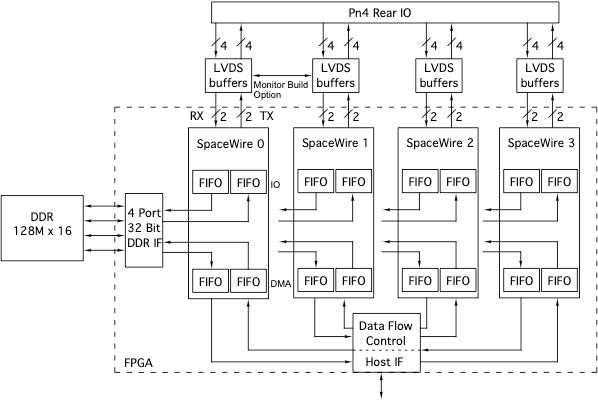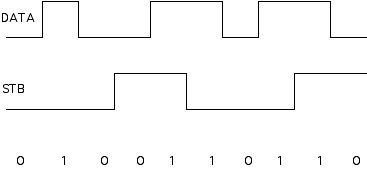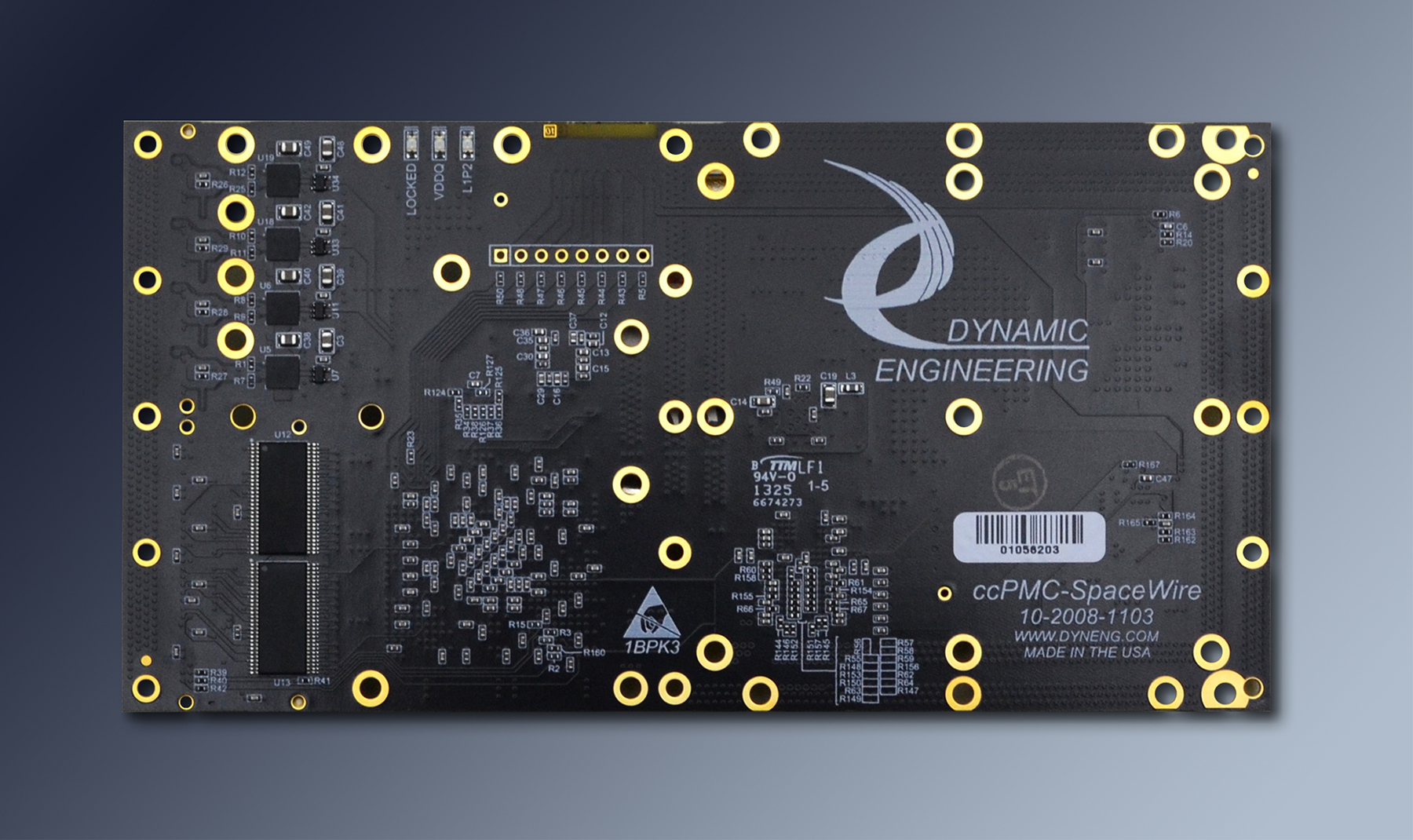ccPMC-SpaceWire
Use PMC adapter for PCIe applications
ccPMC-SpaceWire Description
- ccPMC bridge to SpaceWire with 4 channels / 8 ports
- Designed for rapid user integration with included reference software
- Large User allocatable memory [256 MBytes] with 32 Mbyte default per port
- 8 Independent Scatter-Gather DMA engines to support the 8 SpaceWire ports
- Fast: 1-200 MHz. with autobauding on Rx ports. Each Tx port has a separate PLL reference plus divider
- Low latency, FIFO based design
- Time Code support
- Easy-to-use: heirachical design featuring a direct memory map
- 1 year warranty standard. Extended warranty available.
- Extended Temperature standard. Thermal covers included. Conformal Coating option.
- ROHS and Standard processing available
Utilize SpaceWire to communicate with European Space Agency and NASA equipment utilizing the ECSS-E-ST-50-12C specification. SpaceWire is configured using routers to create a heirarchical point-to-point system with high speed parallel paths.
ccPMC-SpaceWire implements SpaceWire in a convenient Conduction Cooled PMC format. Four fully independent and highly programmable LVDS IO ports are provided by the ccPMC-SpaceWire design. The SpaceWire protocol is advanced with link testing, error handling, command and data protocols built in. The SpaceWire electrical interface is point-to-point with token based flow control. With the SpaceWire protocol it is easy to build a heirarchical architecture system with routers or a home-run wired system. Your equipment can interact with any other node in the system. ccPMC-SpaceWire provides a bridge from PCI ⇔ SpaceWire. Port based DMA offloads the CPU and increases performance in your system. Time Code support provides a complete solution. Please refer to the manuals tab for detailed information
Each port has memory to support RX and TX functions. BK models have more than 32 MBytes per port. The memory is organized as FIFOs 32 bits wide to optimize data transfer from the PCI/PCIe bus. The FIFOs are a combination of internal block RAM and attached DDR memory.
Multiple programmable interrupts are avaialble. The FIFO flags are supported for interrupt driven or polled operation. Programmable Almost Full, Programmable Almost Empty, plus Full, Half Full, and Empty. The programmable flags can be set to any debth to allow software a programmable delay from event to empty or full. The interrupts can be very useful when sending or receiving messages larger than the FIFO size. In addition interrupts and status are available for packet completion, various error conditions etc.
The FIFO design supports loop-back and can be used for Built In Test [BIT]. Memory can be accessed with target or DMA accesses. The host side interface is optimized with independent DMA controllers for each port [8 total]
SpaceWire features automatic link testing when a node is brought on line - released for operation via software. The transmitter sends NULLs until NULLs are received and then sends FCTs until FCTs are received. The initial frequency is specified [ECSS-E-ST-50-12C] to be 10 MHz. Once the auto link test has passed, the hardware can switch to the programmed rate. A local oscillator is used to supply the 10 MHz reference clock for initialization. A programmable PLL is used to support operation once the link is established. The PLL is programmed via software and is referenced to the oscillator.
The SpaceWire protocol has flow control. The local memory on ccPMC-SpaceWire will not overrun. The buffering issue may be upstream - if there is an unbuffered or under-buffered data source that will loose data if the link is throttled back the large storage capability will help. The larger FIFOs will provide more room to accumulate data if the system is not ready to allow ccPMC-SpaceWire to DMA transfer immediately. The DMA transfers are higher bandwidth than the SpaceWire transfers allowing the system to catch-up once the DMA transfers restart. At 100 MHz and 80% data transfer the 8Mx32 FIFO will provide about 3.2 seconds of data storage per port. The host would have to ignore ccPMC-SpaceWire interrupt requests for longer than 3.2 seconds before throttling would occur. In most systems this is sufficient time to stay out of the throttled mode. To unload a full FIFO with DMA running it will take 8M/50M = .16mS => the unload to load multiplier is stongly in favor of the host side allowing the host to catch-up to the SpaceWire link once the delaying event has passed. The actual DMA time will be a bit higher due to system interaction to initialize etc.
Dynamic Engineering software packages support each of the board features including PLL programming - supply the programming file and our SW takes care of programming, FIFO loop-back, external loop-back etc. The reference software is a great starting point for your application software.
ccPMC-SpaceWire is supported with the DESWBO Dynamic Engineering SpaceWire BreakOut tool for debugging SpaceWire systems, cables, and the DESWCB Dynamic Engineering SpaceWire Connector Board which provides a SpaceWire Cable to system cable interface.
If your situation demands a custom application then we will update the Xilinx FPGA. Send us your timing and we will send you the interface.... email us your wish list or call today!
ccPMC-SpaceWire-BK Block Diagram

Model BK diagram shown
The standard timing uses the data and strobe to transmit and to receive the data. The data is transmitted as a command or data. The strobe provides the transitions for clocking when the data is unchanged between adjacent bit times.
ccPMC-SpaceWire Standard Timing

ccPMC-SpaceWire implements SpaceWire in a convenient Conduction Cooled PMC format. Four fully independent and highly programmable LVDS IO ports are provided by the ccPMC-SpaceWire design. The SpaceWire protocol is advanced with link testing, error handling, command and data protocols built in. The SpaceWire electrical interface is point-to-point with token based flow control. With the SpaceWire protocol it is easy to build a heirarchical architecture system with routers or a home-run wired system. Your equipment can interact with any other node in the system. ccPMC-SpaceWire provides a bridge from PCI ⇔ SpaceWire. Port based DMA offloads the CPU and increases performance in your system. Time Code support provides a complete solution. Please refer to the manuals tab for detailed information
Each port has memory to support RX and TX functions. BK models have more than 32 MBytes per port. The memory is organized as FIFOs 32 bits wide to optimize data transfer from the PCI/PCIe bus. The FIFOs are a combination of internal block RAM and attached DDR memory.
Multiple programmable interrupts are avaialble. The FIFO flags are supported for interrupt driven or polled operation. Programmable Almost Full, Programmable Almost Empty, plus Full, Half Full, and Empty. The programmable flags can be set to any debth to allow software a programmable delay from event to empty or full. The interrupts can be very useful when sending or receiving messages larger than the FIFO size. In addition interrupts and status are available for packet completion, various error conditions etc.
The FIFO design supports loop-back and can be used for Built In Test [BIT]. Memory can be accessed with target or DMA accesses. The host side interface is optimized with independent DMA controllers for each port [8 total]
SpaceWire features automatic link testing when a node is brought on line - released for operation via software. The transmitter sends NULLs until NULLs are received and then sends FCTs until FCTs are received. The initial frequency is specified [ECSS-E-ST-50-12C] to be 10 MHz. Once the auto link test has passed, the hardware can switch to the programmed rate. A local oscillator is used to supply the 10 MHz reference clock for initialization. A programmable PLL is used to support operation once the link is established. The PLL is programmed via software and is referenced to the oscillator.
The SpaceWire protocol has flow control. The local memory on ccPMC-SpaceWire will not overrun. The buffering issue may be upstream - if there is an unbuffered or under-buffered data source that will loose data if the link is throttled back the large storage capability will help. The larger FIFOs will provide more room to accumulate data if the system is not ready to allow ccPMC-SpaceWire to DMA transfer immediately. The DMA transfers are higher bandwidth than the SpaceWire transfers allowing the system to catch-up once the DMA transfers restart. At 100 MHz and 80% data transfer the 8Mx32 FIFO will provide about 3.2 seconds of data storage per port. The host would have to ignore ccPMC-SpaceWire interrupt requests for longer than 3.2 seconds before throttling would occur. In most systems this is sufficient time to stay out of the throttled mode. To unload a full FIFO with DMA running it will take 8M/50M = .16mS => the unload to load multiplier is stongly in favor of the host side allowing the host to catch-up to the SpaceWire link once the delaying event has passed. The actual DMA time will be a bit higher due to system interaction to initialize etc.
Dynamic Engineering software packages support each of the board features including PLL programming - supply the programming file and our SW takes care of programming, FIFO loop-back, external loop-back etc. The reference software is a great starting point for your application software.
ccPMC-SpaceWire is supported with the DESWBO Dynamic Engineering SpaceWire BreakOut tool for debugging SpaceWire systems, cables, and the DESWCB Dynamic Engineering SpaceWire Connector Board which provides a SpaceWire Cable to system cable interface.
If your situation demands a custom application then we will update the Xilinx FPGA. Send us your timing and we will send you the interface.... email us your wish list or call today!

Model BK diagram shown
The standard timing uses the data and strobe to transmit and to receive the data. The data is transmitted as a command or data. The strobe provides the transitions for clocking when the data is unchanged between adjacent bit times.

ccPMC-SpaceWire Features
Size
Standard Single ccPMC - 74mm x 143.75mm
Transmit Speeds
10 MHz initial rate per SpaceWire Specification. Software selectable secondary rate for transmit channel. Maximum frequency currently 200 Mhz. programmable PLL with built in low jitter 50 MHz reference combine for user frequency support. PLL reference clocks are LVDS [differential] inputs to FPGA.
PCI Speed
Standard 33 MHz. operation. DMA support or standard R/W operations, DMA is independent per channel - each channel has a pair of DMA controllers to allow long data transfers with minimal CPU overhead and increased performance as well as full duplex operation
PCI Access Width
Standard 32 bit operation supported
Software Interface
ccPMC registers are read-writeable. Transmit and Receive functions separated.
Interrupts
Transmit and Receive state-machines, FIFO Programmable almost empty [transmit] and programmable almost full [receive] have programmable interrupts. Status can be polled for non-interrupt driven operation as well. Time Code interrupt.
Signaling
LVDS interface devices are utilized.
IO Interface
IO is available [4 ports] via Pn4/Jn4 interface. The differential IO is routed with controlled impedance, and matched lengths on each of the pairs.
Interface
ECSS-E-ST-50-12C specification compliant. Time Code supported.
Specification
ccPMC specification compliant
Power
5V and 3.3V from ccPMC connector with 2.5V, 1.2V, 1.5V, .75V converted with on-board regulators.
Memory
Separate FIFOs are provided for TX and RX of each channel. Internal Block RAM plus DDR creating 32 MBytes standard for all ports.
Weight
Approximately 2 oz without Thermal Covers. Approximately 5.3 oz with Thermal Covers. Conformal coating will be additive.
Statement of Volatility
DIP switch
8 position switch is available to allow for configuration control, multiple ccPMC SpaceWire boards, and to facilitate integration
ccPMC-SpaceWire Benefits
Speed
ccPMC-SpaceWire is optimized for serial interfacing requirements. The FIFO memories and programmable interrupts off-load the CPU from most of the management other implementations require. FIFO access is optimized for the PCI bus further reducing overhead by speeding up the data transfer. On the IO side the PMC SpaceWire has independent and interconnected port functions. All ports can operate at maximum rate in parallel.
Price
ccPMC-SpaceWire is available off-the-shelf at a reasonable price. Custom versions can also be arranged. ccPMC SpaceWire is easily programmed to implement new functions. Previously implemented "custom designs" are available too. Without the costs of schematic level design, layout, debugging etc. A modified SpaceWire will represent a large cost and time savings in your budget.
Ease of Use
ccPMC-SpaceWire is easy to use. Point and shoot - just fill the FIFO and set the start bit to get your custom protocol transmitting. Built in loop-back capabilities and reference software help with integration into your system. Windows® Linux and VXWorks driver(s) available.
Availability
ccPMC-SpaceWire is built to order. Dynamic Engineering has on-site manufacturing allowing short lead times for this product.
Size
ccPMC-SpaceWire is a standard single width ccPMC card, and meets the ccPMC mechanical specifications. ccMC-SpaceWire can be used in all ccPMC positions [universal voltage]
ccPMC Compatibility
ccPMC-SpaceWire is ccPMC compliant per the IEEE 1386 specification.
PCI Compatibility
ccPMC-SpaceWire is PCI compliant. You can develop with a PCI e) to PMC adapter - PCI2PMC, PCIeBPMCX1 etc.
Part Number: ccPMC-SpaceWire
Ordering Options
- ccPMC-SpaceWire Standard board - Standard version with 32 MBytes of FIFO per port, standard SpaceWire [ECSS-E-ST-50-12C] timing and protocol. Independent DMA channels and Timecode support. Four ports through Pn4.
Order combinations of the options by simply adding the extension(s) to your order request.
-CC - add Conformal Coating
-ROHS - add ROHS processing
ccPMC-SpaceWire Drivers
Software Support is supplied in the form of Win10/11, and Linux packages. The manuals are available on the SpaceWire Summary page.
ccPMC-SpaceWire Manuals
Hardware. The Hardware manuals for BK models plus related products are available on the SpaceWire Summary page.






